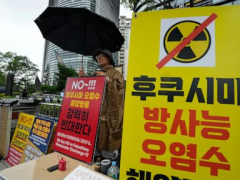TOKYO — The U.N. nuclear agency gave its endorsement on Tuesday to Japan’s planned release of treated radioactive wastewater into the sea from the damaged Fukushima nuclear plant, saying it meets international standards and its environmental and health impact would be negligible.
The plan is opposed by groups in South Korea, China and some Pacific Island nations because of safety concerns and political reasons. Local fishing organizations are worried that their reputation will be damaged even if their catch isn’t contaminated.
Rafael Mariano Grossi, the head of the International Atomic Energy Agency, submitted its final assessment of the plan to Prime Minister Fumio Kishida on Tuesday.
The report is a “comprehensive, neutral, objective, scientifically sound evaluation,” Grossi said. “We are very confident about it.”
The report said IAEA recognizes the discharge “has raised societal, political and environmental concerns, associated with the radiological aspects.” However, it concluded that the water release as currently planned “will have a negligible radiological impact on people and the environment.”
Japan’s plan and the equipment for the discharge are “in conformity with the agreed international standards and its application,” Grossi said.
He said the dilution of treated but still slightly radioactive wastewater for gradual release into the sea is a proven method widely used in other countries, including China, South Korea, the United States and France, to dispose of water containing certain radionuclides from nuclear plants.
Much of the Fukushima wastewater contains cesium and other radionuclides, but it will be filtered further to bring it below international standards for all but tritium, which is inseparab





